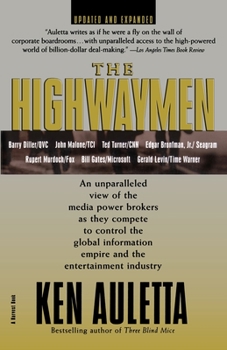The Highwaymen: Updated and Expanded
Select Format
Select Condition 
Book Overview
A struggle is taking place--not just among corporate titans, but among entire industries. At stake is control of the world's fastest-growing industry: communications. The contestants are Hollywood... This description may be from another edition of this product.
Format:Paperback
Language:English
ISBN:0156005735
ISBN13:9780156005739
Release Date:June 1998
Publisher:Harper Business
Length:384 Pages
Weight:0.80 lbs.
Dimensions:0.9" x 5.5" x 8.5"
Customer Reviews
4 ratings
Media and Power
Published by Thriftbooks.com User , 15 years ago
This book made up of 17 New Yorker articles by Ken Auletta written during the 1990s chronicle the major power players in the media business. I enjoyed reading most of the articles especially the ones involving, Time Warner, Viacom, Disney and News Corp and the media moguls behind them. Auletta focuses in many of the ariticles about "The Human Factor" determining the decisions made at the highest levels. Quite often this factor trumps business factors such as increased revenue and profits. The perfect examples are the firing/resignation of Jeffrey Katzenberg at Disney and Frank Biondi at Viacom. Both made large contributions to their respective companies but in the end their personal relationship with their boss made the difference. Michael Eisner at Disney and Sumner Redstone at Viacom seemed to feel their personal power at risk and therefore decided to go forward without Katzenberg and Biondi. I enjoyed reading them as most of them are very well written and uses the narrative style that most business writing unfortunately does not use enough.
Insight on Superhighway Creators
Published by Thriftbooks.com User , 20 years ago
The highway being described in this book is the information superhighway and the people being discussed are its developers. Jumping to the postscript at the very end, Auletta observes "while the Highwaymen enjoy immense power, they remain vulnerable" (p. 355). This is the paradox presented throughout the book. The regulators, entrepreneurs, and public do a dance of vulnerability in the development of the new technologies as niches are being carved out. One of the realities of corporate growth is that as they become large, they sometimes lose the freshness associated with risk and creativity. Auletta says "it becomes more difficult for them to maintain a focus, to make quick decisions, to stay creative" (p. 134).The ancient concept of pathos is explored in 21st century corporate America. In describing how business decisions are made in Sumner Redstone's organizational culture, he quotes an associate as saying "most deals are fifty percent emotion and fifty percent ecnomics" (p. 61).Aulette spends a little time on media content, pointing out the hypocrisy of film producer Oliver Stone, who sees his distortions (to be even more accurate fabrications) as "artistic freedom, while he demands strict accuracy from reporters covering him.The reader is left with numerous insights that would not be attained anywhere else. This book is a worthy read.
Great book on the media business!
Published by Thriftbooks.com User , 23 years ago
This is an interesting series of past news features on the media business. The book chronicles some of the most fascinating media personalities from Rupert Murdoch to Herb Allen to Barry Diller to John Malone to Edgar Bronfman Jr. to Bill Gates. This is a fascinating book by a guy who was given incredible access by a large number of media executives. Highly recommended.
well reported; worth reading
Published by Thriftbooks.com User , 26 years ago
Ken Auletta already proved with Three Blind Mice--his book about the Big Three traditional broadcast networks--that he's a dogged reporter. Few thoughts, musings, or nuances of expression go unrecorded. "The Highwaymen" continues in that tradition. Auletta aims to offer some sense of the men (and they're almost all male) who make the decisions about what the rest of us will be seeing, listening to and seeking for entertainment and how that software will be delivered. He delivers well-wrought profiles of these people through their deeds--which often contrast with their words, and that tension is illuminating. Finally, at the end of each piece are postscripts which offer the reader a scorecard; which of the fearless mogul's bold predictions came true, which crashed a burned: everybody thought interactive/VOD TV was going to take off--so far, it's been a stalled cash-disposal scheme that sucks in capital with no discernable result. The point is that for all their visionary claims, these people are no better at predicting the future than anybody else. If you missed the original pieces as they ran in The New Yorker and have an interest in the thinking (or lack thereof) behind movies like Basic Instinct or any of Oliver Stone's noxious fantasies, buy the book





